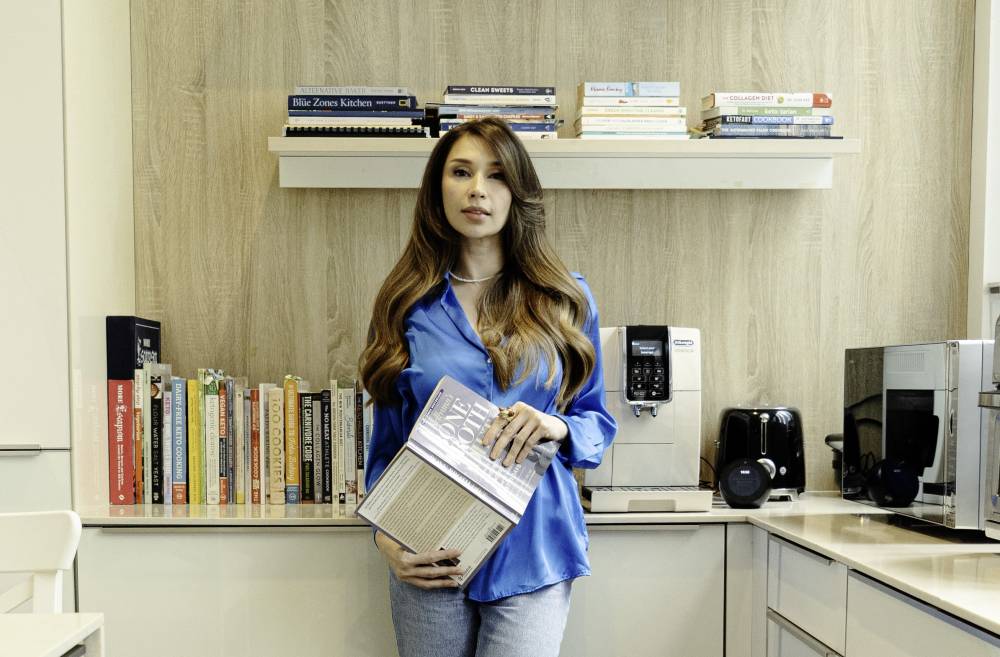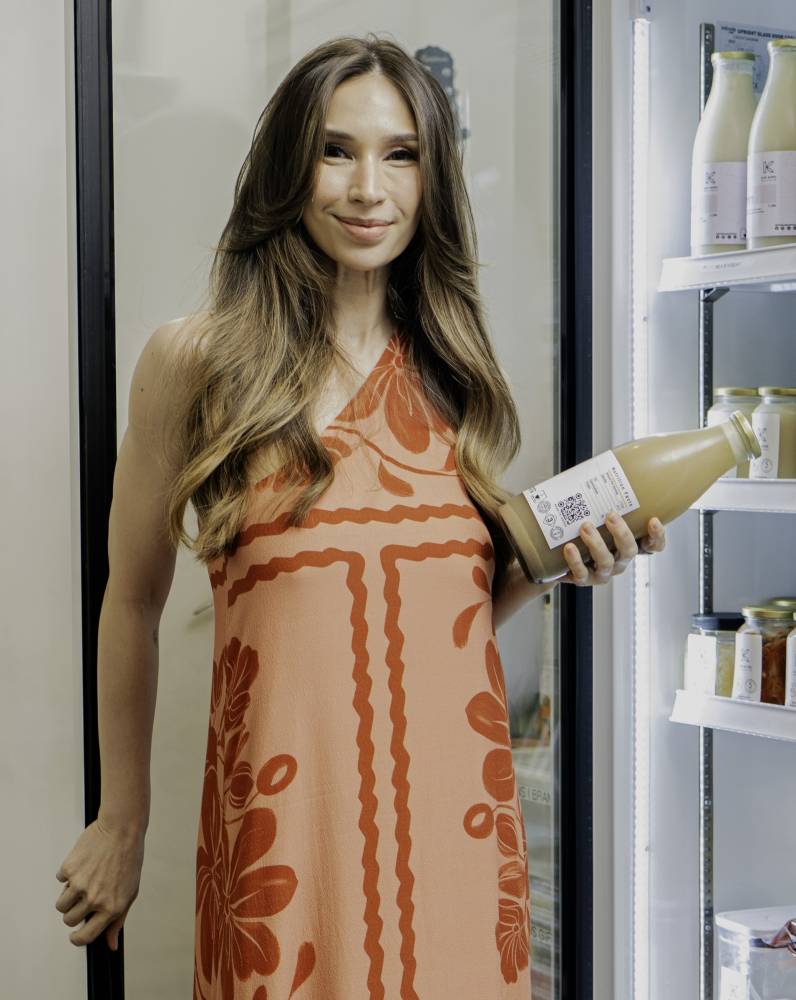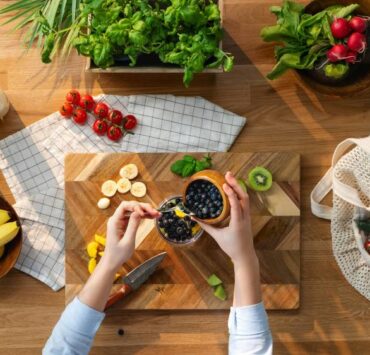Kim King dishes out real good food

“You are what you eat. I’m sure you’ve heard that many times,” Kim King, nutritionist and founder of Kim King Wellness, tells us. We are in her kitchen, surrounded by a plethora of books.
But where a regular kitchen may house cookbooks and recipes, King’s library is of a more specific niche—from titles on bone broth and collagen, to books about diets like keto and paleo, and even recipes for vegetarians and meat-eaters.
On one end of the kitchen—what she calls her “office”—are a selection of meals and food items by her eponymous wellness brand. Stacked neatly are bowls containing a colorful array of dishes, alongside rows of intriguing broth lattes in bottles, and even fruits and vegetables, some of which are being fermented in jars. She excitedly tells us she’ll have us try the dishes, too.
Rooted in a passion for good food
Her passion for food—good food, at that—has been rooted in deeply personal experience. She’s enjoyed cooking even when she was younger, and even had a dream of becoming a doctor. But to fulfill the wishes of her father, she instead went into the hospitality industry. Even then, the call towards the health field remained.
She later took a Master’s in Nutrition at the University of Aberdeen in the UK, pursued further studies in Ateneo de Manila University, human physiology at Harvard, and even studied perinatal and pediatric nutrition after becoming a mom. The more King experienced, the more her interests grew—and so did her list of educational credits.
And still, at just 36 with five children and a thriving business, King is bursting with energy. She tells us it’s all because of good food.
“When I see food now, I don’t have cravings. I see it as ‘I’m going to eat so I can perform well in life,’” King says. “When you see food as support to unleash your best potential as a human being, you become more mindful of what you put in.”
Building good habits
King’s holistic interest in various aspects of health informs every decision in the household. It goes beyond what’s on the dinner table, reflected in every corner and feature of their home.
With five young kids, King considers this an important time to instill good and healthy habits. “They copy what they see,” she says of her children. “My rule at home is, ‘If it’s in the house, everyone can eat it.’ That’s why I’m so mindful of what I bring in.”

In the kitchen, a wall is filled with lists—detailing schedules and allergies of each member of the family. Part of this schedule is also a curious detail: each day features a family member on cooking duty.
“I want them to know how to prepare healthy food,” King says. It’s more than just preparing them for the future; it’s also helping her kids to love the process. She proudly shares, “It excites them. In fact, minsan nag-aagawan pa sila. ‘Can it be me na lang today?’” Being responsible for the day’s meals also boosts the kids’ feelings of confidence and independence, both valuable traits for King.
Fostering a love for music and fitness
King appears to run a tight ship, but there’s a lightness around their household—and I mean this beyond their high ceilings and floor-to-ceiling windows. Throughout our shoot, music reverberates through their home, coming from their treasure trove of a living room that also doubles as a music room.
In this space, a collection of guitars hangs on the wall, while a corner is filled with an assortment of instruments, from piano to drums. “We really value arts and music,” King shares. She points out a few special guitars from her husband Atticus’ collection, while he settles down in front of the piano to practice.
All her kids are also learning music. It’s good for their development, she says—and like everything she shares with us, there’s science to back it up.
“The science shows that any type of art will make the brain function better. It will push the brain cells and neurons to be at [their] optimal level. But nothing can beat music; it’s still the most potent medicine for your brain,” she explains.
Aside from the musical instruments, various fitness tools and equipment accentuate the King family home—exercise rings and rope hang from the ceiling, in the threshold leading to a bathroom, near the dining table, and in the garden, a wall dotted with colorful handgrips and footholds for bouldering. At first, it’s all seemingly random, but it’s actually thoughtfully placed.
To build habits, King says, it’s important to surround yourself with the tools that will encourage it. “I equip my environment where I can thrive, where it becomes convenient for me to excel.” She cites the SAID (Specific Adaptation to Imposed Demands) principle as an inspiration, which in essence states that the body specifically adapts to the type of demands or stress placed on it.
With the equipment being placed around areas of the house they frequent, it’s easier to be reminded to incorporate movement into their routine.
From her family to yours
King’s children are following in her footsteps. Aside from her eponymous brand, Kim King Wellness, King also leads several other food and wellness brands, each with different specialties. The Gut Gang, for example, is a playfully healthy approach to yogurt.
“It’s actually the brand of my kids,” she shares. The yogurt brand was the fruit of conversations between them. “I told them, ‘You know what, if you want to help mama, make something that will help more people.’” The Gut Gang thus focuses on creating gut-friendly snacks and treats like zero-sugar, high-protein frozen yogurt.
King also works with Victoria Bites, the 24/7 food brand of Victoria Court. Established in the 1980s as a Filipino comfort food brand, Victoria Bites, now with King’s involvement, has taken strides towards further improving the quality of their dishes.
“When I stepped in, I said, ‘I have to [make] some changes. If you’ll allow me, I can handle it,’” King continues, emphasizing that she could only sell what she can eat. “The costing is not that different. But the science there—if the food is cooked in canola oil or vegetable oil, it’s more palatable. It rewires your brain to eat more. My goal is not to make people eat more; my goal is to make people eat quality food and feel satiated, not bloated, after.”
“I want people to eat Filipino food and not feel heavy and sluggish. I want to give people access to good and healthy food,” she adds.
Making healthy food accessible
King acknowledges that it’s difficult, especially now, to truly eat healthy. But it’s a challenge she’s passionately taking on. “I feel that the reason we don’t eat so well is [that] we don’t have access to quality food. The system is not designed to make it easier for us.”
“It’s the lack of education and the lack of accessibility. Most of us have to work eight hours a day, and who really has the time to prepare [food]? You have a family to feed, you have a career to build,” she says. Her brands—making food made with quality ingredients more accessible—and her consultation work are her ways of addressing the gaps in the system.
“I really want to push that advocacy,” King says. “There’s so much potential that we have, if only we knew that food is connected to all of those things we want to unleash. It boils down to, if you are healthy to begin with, you will feel limitless.”

















